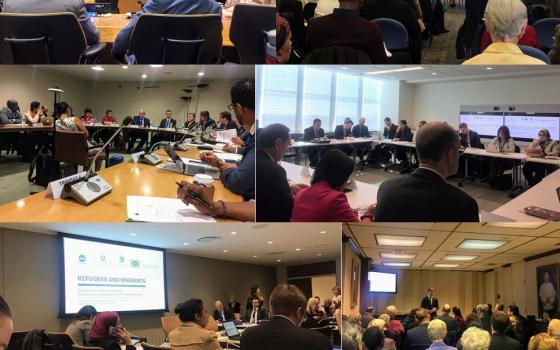Notes from the Field includes reports from young people volunteering in ministries of Catholic sisters. A partnership with Catholic Volunteer Network, the project began in the summer of 2015. This is our seventh round of bloggers: Viviana Garcia-Blanco is a Dominican Volunteer at the United Nations and Geri Lanham is a volunteer with the Religious of Jesus and Mary in Gros Morne, Haiti.
___
New Yorkers waste no time getting to the point when it comes to placing a coffee order or making their way through a crowded subway. This is especially true when it comes to networking with strangers.
About a month into my position, after attending a handful of networking events, I had down the perfect "elevator speech" of my job description that fit the time limit and curiosity of the average professional New Yorker.
As an advocacy associate for the Dominican Leadership Conference, a nongovernmental organization at the United Nations, I work with multiple NGO committees: Committee to Stop Trafficking in Persons, Committee on Migration, Committee on the Status of Women New York, Mining Working Group, and the Working Group on Girls. I participate in monthly member meetings, plan U.N. mission visits to advocate for human rights, provide research and input for subcommittee groups, and publish biweekly updates on official U.N. reports and documents for our Dominican constituency.
A major component to my work involves attending various U.N. events open to civil society groups. It's important to maintain a Dominican presence in U.N. affairs and to inform our community on global issues being addressed. These events focus on climate-induced migration, gender-based violence, protecting the rights of indigenous people, eradicating hunger, and much, much more.
Attending all these events, being a part of these exciting nongovernmental groups, and networking with some phenomenal people is a once-in-a-lifetime opportunity that I never want to forget. However, toward the beginning of my volunteer year, through the haze of excitement and wonder, something left me feeling unfulfilled.
Anyone in my position would have been ecstatic. Graduating with a bachelor's degree in political science and then immediately getting an opportunity to work at such an epic institution like the United Nations is so rare, it's shocking. For some people, it takes years, even acquiring another degree, to get the chance to work at this level. The competition for a position like this is tough, even for a volunteer program through Dominican Volunteers USA. This path chose me, so why wasn't I happier?
Two of my roommates, who are also Dominican Volunteers, work in a women's shelter where they interact with women from all over the city who have experienced systemic injustices. They work with these women and their children to support their needs and to find adequate housing and jobs.
When my roommates come home from work, they share the details of their day with me, good or bad. On their good days, they express this feeling of deep human connection to the women in the shelter, the vulnerability from both sides when they talk about their life journeys, the feeling of comforting another person who feels alone, the curiosity of playing with children who wobble and crawl and latch on to anyone who carries them.
This sense of human connection is absent in my volunteer work. I don't mean this in the sense that I have no human contact or that I don't bond with some of my peers at work. I mean this in the sense that often working at the international advocacy level, I tend to focus too much on the broader issues at hand and forget about the individuals the problem affects.
Going into my volunteer year, I knew the advocacy associate position was one of the few indirect service positions that Dominican Volunteers USA offered, but I wanted the role anyway: It was an opportunity for me to explore a different side of advocacy work. I wanted to have a well-rounded experience where I could use what I learned working on the community-based level and apply it at the international level.
Although I knew the indirect service component to the volunteer position, I still felt unprepared for this alien feeling of what exactly indirect service entailed for me. I was so used to doing direct service in my community back home, where I got to work one-on-one with people, experience another person's being, and really immerse myself in the issues plaguing my community. I had witnessed these injustices firsthand and lived through this pain through the lives of others.
It took time and some deep reflecting, but after seven months, I have gained a newfound appreciation for indirect service. At first, it was hard to wrap my mind around this mentality that indirect service is just as meaningful and important as direct service. We tend to forget the people who work behind the scenes, who are just as important.
Direct service isn't the only means of helping communities at the local or the global level. Indirect service requires people who put in the diligent work without necessarily seeing or expecting anything in return. This is especially true for policy advocacy, as this kind of change takes time, effort, commitment and hope from all parties.
Sometimes, indirect service entails sitting at a desk behind a screen, trying to find motivation in doing research on a monotonous topic, or sometimes it's sitting in a crowded conference room meeting after meeting after meeting, but that doesn't mean that nothing isn't changing.
It took a long time for me to see this and truly appreciate the work I was doing, but I finally did. I understand now that service can look like many things, not just a stereotypical idea of what we are led to believe. Wherever your service leads you — in an office, in a classroom, at a meeting, or on a train ride home — don't lose sight of what is always at stake: real people's lives.
[Viviana Garcia-Blanco is a Dominican Volunteer serving as an advocacy associate for the Dominican Leadership Conference nongovernmental organization at the United Nations.]

